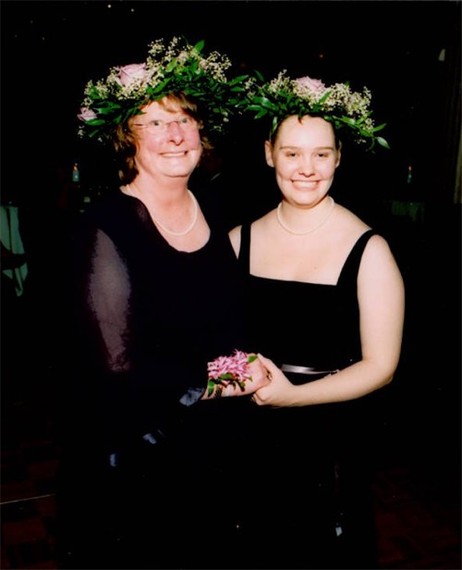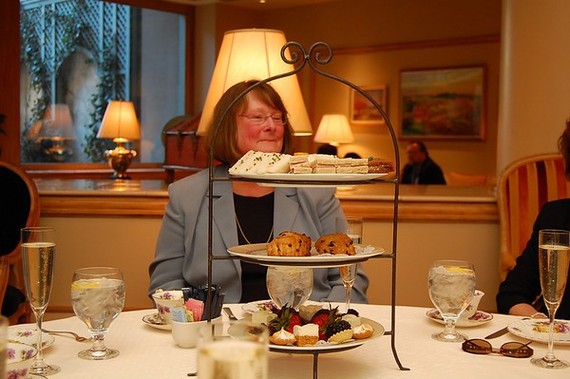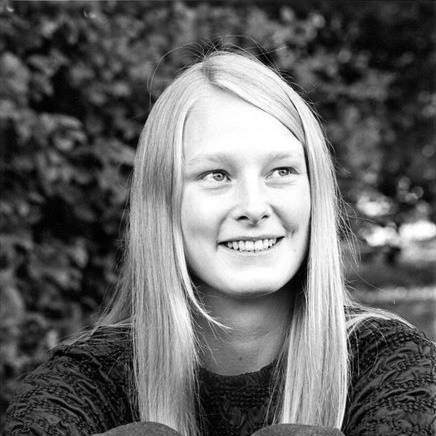
Seven years ago today, on September 24, 2008, I woke at 5 am to the sound of my cell phone vibrating on a table in my entrance hall. My sister had called, twice, and left a message. I rang back, bleary eyed, my still-sleepy mind thinking she was calling to give me advice about a fight I was having with my previous apartment complex (they were taking my security deposit for bogus reasons, the jerks.) Even as she spoke, I had trouble getting out of that not-quite-awake-yet mindset where I kept wondering how mom falling down in the hall and getting taken to the hospital had anything to do with my old apartment.
Fear makes you do funny things. As the sun started to rise in California, I sat on my couch and posted on a small internet community about how scared I was for my mother and that I didn't know what was going on. I spoke to my father, briefly, who helped me convince myself that I didn't need to book the first flight back home to Pennsylvania and that everything was probably okay. I packed a suitcase, poorly, with only black clothing. I took a shower and I drove myself and my boyfriend (now husband) to work.
I sat at my desk and waited. One of my good friends who posted on the same message board came to my door and looked at me, incredulous, and asked why I was at work. Stunned, I looked up and said something like, "where else would I be?"
When my sister called, I left my office and sat in front of the building on uncomfortable metal patio chairs that were bolted into the concrete. She told me that mom was brain dead. I can't tell you what else we talked about during this conversation because it's not in my head anymore. I remember asking to keep mom on life support till I got there and my sister telling me that wasn't going to be possible. I remember seeing my boss walking towards me from the parking lot, ready to start his day, and greeting him by way of sobbing hysterically, hiccuping something unintelligible about my mom being dead.
I went back into the building, gathered up some packages I'd been working on mailing to people, and walked them to the front desk, trying to explain that I needed them to be shipped out but I also had to leave because my mother had died. My dear friend, Dawn, found me and got me out of the building (I must have conveyed the situation to her somehow, or maybe she walked into the building to find me at the front desk amidst a jumble of packages and mailing labels.)
My work was a thirty minute drive via highway from my apartment. I sobbed, hysterically, with gulping, snotty breaths, the entire drive. At one point, a friend who had also lost his mother suddenly called me, and it was only then I thought "I'm using a cell phone without it being hands free. This is illegal and dangerous. I hope a cop doesn't see me" as if that was the most dangerous part of my journey.
There were no direct flights to Pennsylvania so I went to New York to meet my father, who I would stay with for the night. The next day he drove me down to my mother's house so I could help deal with everything that comes after your mother dies. I flew on one of those giant planes that had three rows of seats: two, three, two. I sat in the center of the middle set of seats with two businessmen on either side of me. Tragedy takes on a filmy surrealistic quality when your grief is that intense, so it felt appropriate that these two businessmen would spend the six hour flight talking over and around me as I bowed my head and cried. I remember them remarking to each other that they'd hoped my seat would be empty; they'd each chosen an aisle because they hated getting the middle seat. This is the memory that is most vivid for me that day: them handing each other papers and joking about work while a 25-year old girl cried compulsively between them. Back then, I was the kind of person who would have gotten super pissed about them, but on that day, it made sense.
When I walked through the front door of my mom's house, I think I smiled and said hello to my family waiting there. My sister later told me when she saw me she thought, "she's got a lot of catching up to do," because she'd expected me to walk into the house and break down into tears. The night before, there had been a lot of tears in that house.
That didn't ever really happen for me. There were moments when I lost my shit, like when I called my psychologist to tell him I had to reschedule our appointment because I was in Pennsylvania and my mom had died. I was apologetic (the cancellation was last minute; I'd forgotten the appointment until it popped up on my phone) but he was shocked, horrified, and wanted to help. I was embarrassed that his empathy made me cry.
I now know that this is what shock looks like. Shock and coping.
My mother had incurable cancer (cutaneous T-cell lymphoma; it's rare) but this isn't what killed her. Her obituary says she died of heart failure, which always struck me as stupid since we all die of heart failure. That's literally what death is: heart failure. The truth is, we don't really know why my mother died, only what she died from. Something ruptured in her intestines, probably days before her collapse, and for reasons of circumstance or pride or some superhuman tolerance for pain, my mother didn't go to the doctor. On Wednesday, September 24, 2008, her dog walker came to the house to find her rambling incoherently and then she collapsed on the stairs and never woke up.
A lot of bad shit happened in the weeks and months following the death of my mother. Death can bring out the best in people (Dawn, for getting me out of the office, into my car, and on a plane; my boss, for calling me in the cab so I could hear a voice for a minute; every single person who posted on that internet forum to help me get through the day) and it can also bring out the worst in them. My mother's death brought a lot of really horrible baggage and exposed the evil in some people who were in my life and now no longer are.
The death of a loved one is an intense and often life-changing event. My mother had terminal cancer: it wasn't an immediate death sentence and, in fact, she'd been living with it for years and while I believed it would shorten her life, I fully expected her to keep on keepin' on for at least another decade. That might have made losing her so suddenly and so young all the worse: I thought I had been preparing for this, more than most people will ever be able to prepare. But in those preparations, I became vulnerable to the randomness in life that kills your mother on a Wednesday in September two weeks before her 57th birthday.
In many articles like these, folks usually segue now into lessons learned from these tragedies. That you should live every day to its fullest, or like it's your last. That you should always say what you think and feel because you never know if you'll have another chance. Seven years ago, these platitudes would have made me gag. Today, they might make me start crying (I've taken several breaks to not cry while writing this) but those words still make me gag. They are generalizations -- coping mechanisms in their own way. Empty sound bites without that painful, exposed center that is the never-healing wound of our grief.
Over the past seven years, I have changed significantly as a person and all of those changes stem from the death of my mother. Some of these changes are unwelcome additions in my life: people don't call me late at night or early in the morning because they know it will cause white-eyed panic. But the others, the ones I've gone into purposefully, have made me a much better and stronger person. And while I would much rather have had my mother these past seven years and would trade all these growth moments, there's still value in what I've learned that can be shared to help others.
The core principle with which I live my life now will sound, at face value, like one of the platitudes I just eschewed above.
Never regret.
When I say this, though, I mean it with a religious-like ferocity. I don't make snap decisions anymore. I have dissected myself, identified my weaknesses and uglinesses and shitty qualities, and I work to improve what I can and own to what I cannot. That kind of soul searching is not fun, is not kind, and is never, ever easy. It's impossible to get to a point where you can make decisions with the widest array of information possible without that kind of unflinching introspection. Not regretting does not mean "always be right," either. It means that when you look back on the decision you have made, the path you have taken, you would not have changed what you did.
We do so many things in our life that we can't take back. We end friendships, break up with lovers. We say cruel things to each other. We move jobs, move homes, move to different states or countries. We don't always take the best path, but we can take the right path for ourselves. To do that, we have to be able to take a hard look at what we want, what we need, what we love and what we hate. We can't lie to ourselves, and let's face it: we lie to ourselves when shit gets real. We want to live our best lives and be our best selves but sometimes our best selves are pock marked with selfishness, mean streaks, bad tempers, or something else equally ugly. Unless we face all the bad with the good, we can't make decisions we'll never regret, because we're liars.
And that brings me to the second guiding principle of my life.
Make sure the things around you are net positive.
I lost far more than my mother in the year following her death. The whole year feels like life kept punching me repeatedly in the face, then kicking me with a steel toed boot when it finally had me down on the ground. I navigated my way out of that mess by figuring out what brought more good to my life than bad.
This does not mean you should only fill yourself with things that make you feel positive. Negativity is a necessary component of life. Pain, anger, sadness -- we need it. Trying to find a life that is without these things is finding a life that is unbalanced and probably fairly unhealthy (if not an outright falsehood or delusion.) Operating with the idea that I live life without regret, accepting both the good and the bad in myself and others, I found it easier to be able to honestly assess the positives and negatives in situations and relationships. When you figure out that, the next step is easy: if something brings more negative to the table than positive, get rid of it.
I last spoke to my mother five days before she died. I was driving home from work, en route to a party for a product we'd just launched, and I called her to just say hey. The call was short, shorter than usual: mom and I didn't talk on the phone that often, but that Friday we spoke for maybe five minutes. She didn't feel well, she'd said, and didn't have the energy to talk. I now know that she was dying but I didn't know it at the time. I could agonize over that last conversation, but honestly, I don't remember a word of it beyond how tired and sick she sounded, and how that troubled me, briefly, because she was acting slightly out of character. Instead, I remember that I called her, that we talked, that she was happy I'd called.
After seven years, I know that things aren't ever going to get easier for me in terms of my mother and her death. I'll still start crying randomly over something having to do with mothers on TV. Random, innocuous happenings in everyday life will occasionally take my breath away with sadness, or fear, or longing. I watch over my father like a hysterical chihuahua. The infrequent dream where I see my mother guts me like a fish. Writing articles like this are still slightly more painful than having a toenail taken off.
My mother was a very flawed woman and we had a very complicated relationship. I loved her, warts and all, and I wish she were still alive today. She taught me many things about myself and how to live life, for better or for worse, and her last lesson was no more complex than all the others that came before, but I am thankful for it.
Never regret. Know who you are with all the good and the bad that comes with that knowledge. Surround yourself with things that make your life better, and never settle for anything less than that.
That might not be easy, but life rarely is.
---
This post was first published on Medium where I often post blogs about marketing, community, the tech industry, women's issues, and other random things.
You can also follow me on Twitter.


